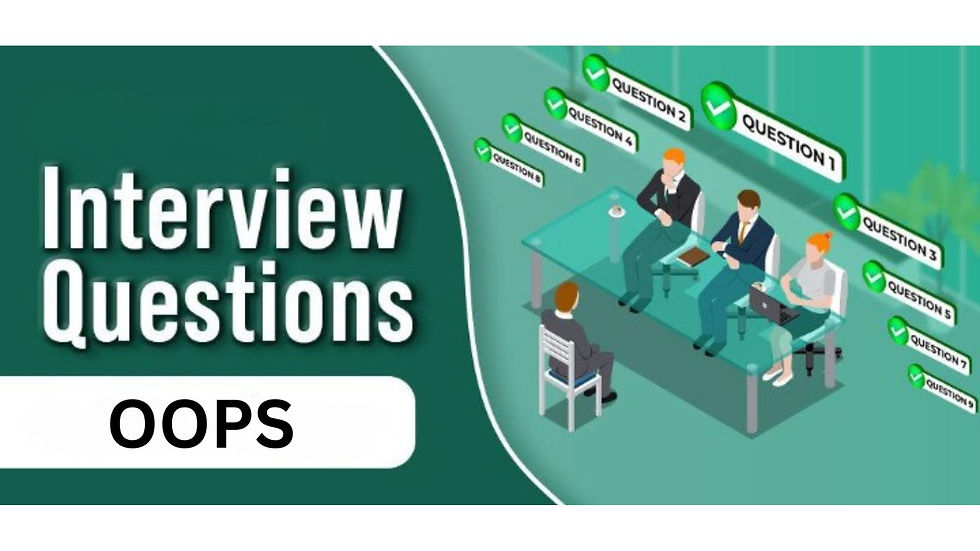What are the differences between basic and advanced Flutter interview questions?
- Divyansh WsCube
- Nov 1, 2023
- 3 min read

Introduction
The journey to landing your dream Flutter developer job often involves preparing for a wide range of interview questions. Flutter, Google's open-source UI software development kit, has gained immense popularity in the world of mobile app development. Whether you're a beginner or an experienced developer, it's essential to understand the differences between basic and advanced Flutter interview questions and how to prepare for both. In this blog, we'll unravel the key distinctions and provide tips for acing your interviews.
Basic Flutter Interview Questions
Basic Flutter interview questions are designed to assess your foundational knowledge of Flutter's core concepts and principles. They typically cover the following areas:
1. Flutter Fundamentals
What is Flutter, and how does it differ from other mobile app development frameworks?
Explain the concept of a "widget" in Flutter.
What is the Flutter widget tree, and how does it influence app structure?
2. Widget Basics
Differentiate between stateless and stateful widgets in Flutter.
How do you create a new widget in Flutter, and what are the key methods you should implement?
Discuss the role of the build method in a Flutter widget.
3. State Management
What is state management in Flutter, and why is it essential?
Explain the use of the setState method and when to use it.
What are the limitations of using setState for state management?
4. Widget Layout
How do you create responsive layouts in Flutter using constraints and media queries?
Explain the usage of Column, Row, and Stack widgets for layout design.
5. Navigation
Discuss Flutter's navigation system. How do you navigate between screens in a Flutter app?
What is a Navigator and how does it work?
Basic Flutter questions primarily aim to evaluate your understanding of the framework's fundamental concepts and your ability to build simple mobile applications. To prepare for these questions:
Read official Flutter documentation and explore introductory tutorials.
Practice building basic Flutter apps, paying attention to widget creation and layout design.
Take online courses or watch tutorial videos aimed at beginners.
Advanced Flutter Interview Questions
Advanced Flutter interview questions delve into complex topics and expect a deeper understanding of Flutter's advanced features. These questions often cover areas like:
1. Custom Widgets
How do you create custom widgets in Flutter, and when is it necessary to do so?
Explain the process of passing data to custom widgets using constructors.
2. State Management Solutions
Discuss various state management solutions in Flutter, such as Provider, BLoC, and River pod.
When would you choose one state management solution over another, and why?
3. Animation and Effects
How can you implement animations in Flutter, and what are some common animation widgets and libraries used?
Explain the use of Hero animations and custom animations.
4. Network Requests
Discuss making HTTP requests in Flutter and handling responses.
What are the advantages of using libraries like http and Dio for network requests?
5. Testing and Debugging
How do you write unit tests and widget tests in Flutter to ensure app quality?
What debugging tools and techniques do you use for Flutter development?
6. Performance Optimization
Explain strategies for optimizing the performance of a Flutter app, including reducing build and render times.
Discuss techniques to handle large lists efficiently.
Advanced Flutter interview questions challenge your expertise and problem-solving skills. To excel in these interviews:
Work on real-world projects that incorporate advanced Flutter features.
Contribute to open-source projects or explore complex GitHub repositories.
Stay updated with the latest Flutter developments by following official Flutter resources and developer communities.
Conclusion
In your pursuit of a Flutter developer role, it's crucial to distinguish between basic and advanced interview questions. Tailor your preparation to your experience level, and gradually progress from mastering the fundamentals to delving into the intricacies of Flutter. With a robust understanding of both basic and advanced concepts, you'll be well-prepared to impress potential employers with your Flutter knowledge and skills.



Comments